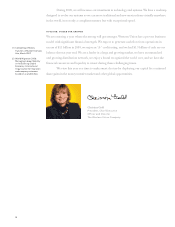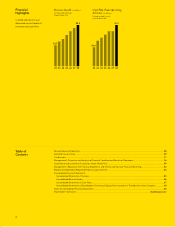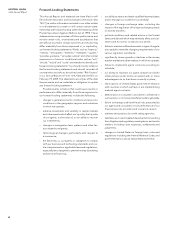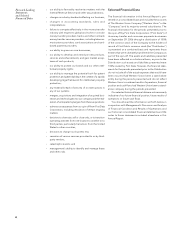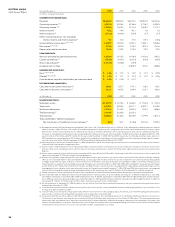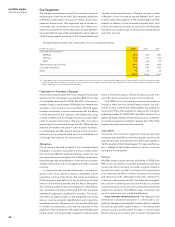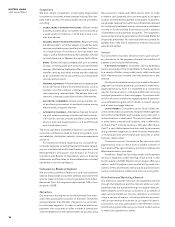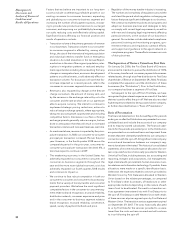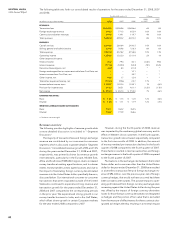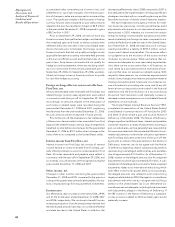Western Union 2008 Annual Report Download - page 17
Download and view the complete annual report
Please find page 17 of the 2008 Western Union annual report below. You can navigate through the pages in the report by either clicking on the pages listed below, or by using the keyword search tool below to find specific information within the annual report.15
Our Business
15
As part of our strategy, we are focused on expanding
and globalizing our consumer-to-business segment and
increasing our number of bill payment options. We have
begun expanding our international bill payment business
outside of Argentina to Peru and Panama and we are
beginning to offer bill payment services under our Vigo
brand.
Industry Trends
The consumer-to-business payment industry has evolved
with technological innovations that created new methods
of processing payments from individuals to businesses.
We believe that the United States is in the midst of a trend
away from cash and paper checks toward electronic pay-
ment methods accessible through multiple technologies.
Furthermore, due to the recent weakening in the United
States economy, we believe some consumers who are
likely to use our services are having difficulty paying their
bills and are unable to obtain credit in any form, resulting
in us handling fewer bill payments. We expect this trend
to continue in 2009.
The consumer-to-business payment industry outside
the United States is at varying stages of development. In
some countries, walk-in cash payments at a biller’s office
or through a third-party network are widely used, while in
other countries electronic payment options, particularly
through direct debit, are widely accepted.
Competition
Western Union competes with a diverse set of bill payment
service providers offering both cash and electronic-based
payment solutions. Competition in electronic payments
includes financial institutions (which may offer bill-payment
services in their own name or may “host” payment services
operated under the names of their clients), billers offering
their own or third-party services to their own customers, and
third-party providers of all sizes offering services directly
to consumers. In many cases, competitors specialize in a
small number of industries. Competitors for cash payments
include a biller’s own walk-in locations, or those provided
by others, some only on a regional basis, as well as mail
and courier services. There is also competition between
electronic and cash-based payments methods.
The most significant competitive factors in this segment
relate to brand recognition, trust and reliability, conve-
nience, speed, variety of payment methods and price.
For additional details regarding our consumer-to-
business segment, see Management’s Discussion and
Analysis of Financial Condition and Results of Operations
and our historical financial statements and the notes to
those statements included elsewhere in this Annual Report.
Other
Our remaining business units are grouped in the “Other”
category, which includes money orders and prepaid
services.
We market Western Union branded money orders,
issued by a third-party, to consumers at non-bank retail
locations primarily in the United States and Canada. On
July 18, 2008, an agreement was executed with Integrated
Payment Systems Inc. (“IPS”), a subsidiary of First Data,
whereby we will assume the responsibility for issuing
money orders effective October 1, 2009 (the “Transition
Date”). Prior to the Transition Date, money order revenue
is generated through a combination of commissions col-
lected from IPS and per item fees for money orders sold. In
a money order transaction, a consumer purchases a money
order from an agent. The agent selling the money order
generally remits the funds collected from the consumer
to IPS promptly following the sale date. IPS holds those
funds to meet regulatory requirements and to pay money
orders presented for payment. Agents generally receive
no commissions from us on money order sales, but rather
earn revenue by charging a fee to the consumer for the
purchase of the money order. IPS currently holds the settle-
ment assets related to our money order business. Under
the terms of the agreement, beginning on October1, 2009,
IPS will assign and transfer to us certain operating assets
used by IPS to issue money orders and an amount of cash
sufficient to satisfy all outstanding money order liabilities,
which vary from day to day but approximate $800million.
After the Transition Date, the settlement assets transferred
to us will be subject to regulatory requirements for the
money order business under our existing licenses and we
will no longer provide to IPS the services required under
the original money order agreement or receive from IPS
the fee for such services. Subsequent to the Transition
Date, a substantial portion of our revenues, which will
replace the fee we currently earn from IPS, will be earned
from investment income on the float balance of unpaid
money order obligations. However, IPS will continue to
provide to us clearing services necessary for payment of
the money orders in exchange for the payment by us to
IPS of a per-item administrative fee.
We also offer prepaid services consisting of:
º
a Western Union branded prepaid MasterCard card
and Visa card; and
º
third-party top-up services in the United States and
Argentina.
The Western Union branded prepaid MasterCard card is
sold through select agents in the United States and on the
internet, and our Western Union branded prepaid Visa card
is also sold on the internet. Our “top-up” services allow
consumers to pre-pay for mobile phone or other services,
and otherwise store value with service providers that can
be accessed by the consumer in the future.
Expenses incurred in connection with the development
of certain new service offerings, including costs to develop
mobile money transfer services and new prepaid service
offerings, and non-recurring costs incurred to effect the
spin-off are included in “Other.”


